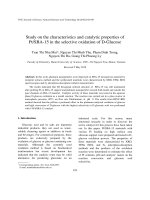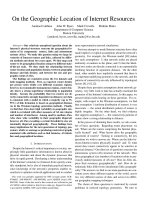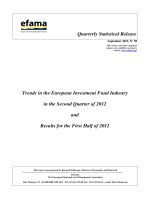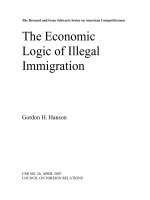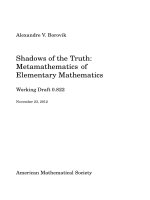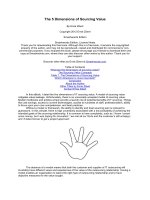THE SECOND ADMINISTRATION OF THOMAS JEFFERSON potx
Bạn đang xem bản rút gọn của tài liệu. Xem và tải ngay bản đầy đủ của tài liệu tại đây (30.03 MB, 490 trang )
973.4
973.4
A21
T.3
Keep
Your
Card
in This
Pocket
Bottkt* will
hf-
issued
only
OR
presentation
ofi
proper
library
eardft,
unlesH
lalwll
othw-wifie,
hooks*
may
he
retained for
four
weelw.
Borrowers
finding
Imoktf
tti^rked,
defaced
or
itiiitllated
a,r^
ex-
jx^'ted
to
teport
mva^
ut
library
deakj
oth<r-
"wiH**
the last
borrower
will
be held
i^i'on-^ihlf*
for
all
imperfections
clwc*owrwl.
The
card
bolcier
is
raseponsniip-
for
all Ix^okn
drawa on life
c*^,rd
T
Feaalty
for
over-dufe
hoofcg
2e
a
<lay
plus
efftnte tod
eltum^f-
of
ressidenw
b*
reportod
promptly.
PUBLIC
LIBRARY
Kansas
City,
Mo.
Keep
Your
Card
in this
Rocket
C
L
S^
A?Y
\
SECOND
ADMINISTRATION
OF
THOMAS
JEFFERSON
18051809
-,
^
:
UNITED STATES OF AMERICA
Dimma
THS
sicom
IBMIKISTRATION OF
THOMAS JEFFERSON
BY HENRY
ADAMS
VOL.
L
NEW"
YORK
CHARLES
SCRIBNER'S
SONS
1921
Copyright,
1890
BY CHAELES
SCKIBNEE'S
SONS-
Copyright,
1918
BY
HENRY
ADAMS
MR
24
'27
CONTENTS OF VOL.
I.
I. INTERNAL IMPROVEMENT
1
II.
MONROE'S
DIPLOMACY
22
III. CABINET
VACILLATIONS
34
IV. BETWEEN
FRANCE AND*
ENGLAND
80
V.
THE
FLORIDA
MESSAGK
103
VI.
THE
TWO-MILLION
ACT
126
VII.
JOHN RANDOLPH'S
SCHISM
147
VIII. MADISON'S
ENEMIES
172
IX.
DOMESTIC
AFFAIRS
197
X. BURR'S
SCHEMES
219
XI.
BURR'S
PREPARATIONS
245
XII.
ESCAPE
PAST
FORT MASSAC
288
XIII.
CLAIBORNE AND
WILKINSON
295
XIV.
COLLAPSE
OF
THE
CONSPIRACY
318
XV.
SESSION
OF 1806-1807
844
XVI. THE
BERLIN
DECREE
870
XVII.
MONROE'S
TREATY
892
XVIII.
BEJECTION OF
MONROE'S
TREATY
415
XIX.
BURR'S TRIAL
.
441
THE
CHAPTER
L
A SECOND
time President
Jefferson
appeared
at the
Capitol,
escorted
with
due
formalities
by
a
procession
of militia-men
and other
citizens
;
and once
more
he
delivered
an
inaugural
address,
"in
so
low
a
Toice
that not
half of
it
was
heard
by
any
part
of
the
crowded
auditory."
1
The second
Inaugural
roused
neither
the
bitterness
nor
the
applause
which
greeted
the
first,
although
in
part
it
was
intended
as
a
cry
of
triumph
over
the
principles
and
vanishing
power
of
New
England.
Among
Jefferson's
manuscripts
he
preserved
a
curious
memorandum
explaining
the ideas
of this
address.
As the
first
Inaugural
declared
the
princi-
ples
which were
to
guide
the
government
in
Repub-
lican
hands,
the
second
should
report
the
success
of these
principles,
and
recall
the results
already
reached.
The
task
deserved
all
the
eloquence
and
loftiness
of
thought
that
philosophy
could
command
;
1
Diary
of J.
Q.
Adams
(March
4,
1805),
i. 373.
TOL.
in.
1
2
HISTORY
OF
THE
UNITED
STATES.
CH.
i.
for Jefferson
had made
a
democratic
polity
victorious
at
home and
respectable
in
the
world's
eyes,
and the
privilege
of
hearing
him reaffirm
his
doctrines
and
pronounce
their
success
was one
that
could
never be
renewed.
The Moses
of
democracy,
he
had
the
glory
of
leading
his
followers
into
their
promised
and con-
quered
Canaan.
Jefferson
began by
renewing
the
professions
of
his
foreign
policy
:
u
With
nations,
as
with
individuals,
our
interests,
soundly
calculated,
will ever
be
found
inseparable
from
our
moral
duties
;
and
history
bears witness to the
fact
that
a
just
nation
is
taken
on its
word,
when
recourse
is
had to
armaments and wars
to
bridle others.
"
The sentiments
were
excellent
;
but
many
of
Jef-
ferson's
followers
must
have asked
themselves
in
what
history they
could
find
the
fact,
which
the
President
asserted,
that
a
just
nation was
taken
on
its
word;
and
they
must have been still
more
per-
plexed
to
name
the
nation,
just
or
unjust,
which was
taken on its
word
by any
other
in the
actual
condi-
tion of
the
world.
Without
dwelling
on
this
topic,
which
had
already
become
one
of interest
in the
councils
of
his
Cabinet,
Jefferson,
passing
to
practical
questions
involved
in
redemption
of
debt,
advanced
a
new
idea.
"Redemption
once
effected,"
he
said,
u
the
revenue
thereby
liberated
may, by
a
just repartition
among
the
States
and a
corresponding
amendment
of
the
Constitu-
tion,
be
applied,
in
time
ofpeace,
to
rivers,
canals,
roads,
1805. INTERNAL
S
arts, manufactures,
education,
within
each
State.
In
of
icar,
if
injustice,
by
our-
selves
or
others^
must
some
times
produce
war,
as
the
same
revenue
will
be increased
by
population
consumption,
and aided
by
other
resources
reserved
for
that
crisis,
it
may
meet within
the
year
all
the
of
the
year
without
encroaching
on
the
rights
of future
generations
by burdening
them with
the debts
of
the
past.
War
will
then
be but a
suspension
of useful
works,
and
a
return to
a
state
of
peace
a
return
to the
progress
of
Improvement/'
Ten
years
earlier,
in
the mouth
of
President
Wash-
ington,
this
sentiment
would have been
generally
denounced
as
proof
of
monarchical
designs.
That
Jefferson
was
willing
not
only
to
assume
powers
for
the
central
government,
but
also to
part
from Ms
States-rights
associates and
to
gratify
the
Northern
democrats
by many
concessions
of
principle,
his
first
Administration
had
already proved;
but John
Ran-
dolph
might
wonder
to see
him
stride
so fast
and far
toward
what
had
been ever
denounced
as
Roman
imperialism
and
corruption;
to
hear
him advise
a
change
of
the
Constitution
in
order
to
create
an
annual
fund
for
public
works,
for
the
arts,
for edu-
cation,
and
even
for such
manufactures
as the
people
might
want,
a fund
which was
to
be distributed
to
the
States,
thus
putting
in
the
hands of
the
central
government
an
instrument
of
corruption,
and
making
the
States
stipendiaries
of
Congress.
Every
principle
of
the
Eepublican
party,
past
or
to
come,
was
put
to
4
HISTORY
OF
THE
UOTTED
STATES.
CH.
i.
nought
by
a
policy
which
contradicted
the
famous
sen-
timent
of Jefferson's
first
annual
message
:
"
Sound
principles
will
not
justify
our
taxing
the
industry
of
our
fellow-citizens
to accumulate
treasure for
wars
to
happen
we know
not
when,
and
which
might
not
perhaps
happen
but
from
the
temptations
offered
by
that
treasure."
Yet
pregnant
as
this
new
principle
might
be
in
connection with
the
Constitution
and
the
Union,
its
bearing
on
foreign
affairs
was more
start-
ling*
Jefferson,
the
apostle
of
peace,
asked
for
a
war
fund
which should
enable his
government
to
wage
indefinite hostilities
without
borrowing
money
!
Quitting
this
dangerous
ground,
the
President
spoke
of
the
Louisiana
purchase.
Then
followed
a
paragraph
upon
religion.
Next he
came
to
the
sub-
ject
of
the
Indians,
and
chose this
unusual
medium
for
enforcing
favorite
philosophical
doctrines. The
memorandum
written to
explain
his
address de-
clared
the
reasons
that led
him to
use
the mask
of
Indian
philanthropy
to
disguise
an
attack
upon
con-
servatism.
1
"
Every respecter
of
science,"
said this
memorandum,
"
every
friend
to
political
reformation,
must
have
ob-
served
with
indignation,
the
hue-and-cry
raised
against
philosophy
and
the
rights
of man
;
and it
really
seems
as
if
they
would be
overborne,
and
barbarism,
bigotry,
and
despotism
would
recover the
ground
they
have
lost
by
the
advance
of
the
public
understanding.
I
have
thought
the
occasion
justified
some
discountenance of
these
anti-social
1
Jefferson's
Writings (Ford),
viii
341.
1805.
INTERNAL
5
doctrines,
some
testimony
;
but not
to
com-
mit
myself
in
direct
warfare
on
1
It
best
to
say
what
is
directly
applied
to the
oa!y
f
but
admits
by
inference a more
general
extension."
In
truth,
under
tlie
lead
of
Napoleon
and
Pitt,
Europe
seemed
bent
on
turning
back
the
march
of
time
and
renewing
the
bigotry
and
despotism
of
the
Middle
Ages;
but
this
occasion
hardly dignified
Jefferson's
method
of
bearing
testimony against
the
danger,
by
not
committing
himself
to
direct
warfare
upon
it,
but
by
applying
to
Indians
the
homily
which
by
inference
included
the
churches
of
New
England.
"The
aboriginal
inhabitants
of
these
countries,"
said
the President
to
his
great
audience,
"
I
have
regarded
irith
the
commiseration
their
history
inspires.
Endowed
with
the faculties
and
the
rights
of
men,
breathing
an
ardent
love
of
liberty
and
Independence,
and
occupying
a coun-
try
which
left
them
no
desire
but to
be
undisturbed,
the
stream
of
overflowing
population
from
other
regions
directed
itself
on
these
shores."
If the
Boston
newspapers
were
not
weary
of ridi-
culing
Jefferson's
rhetoric,
this
sentence
was
fitted
to
rouse
their
jaded
amusement
;
but
in a
few
moments
they
had
reason
to
feel
other
emotions.
He said
that
he
had done
what
humanity
required,
and
had
tried
to
teach
the
Indians
agriculture
and
other
industries
in
order
to
prepare
them
for
new
conditions
of
life,
a
claim
not
only
true,
but
also
honorable
to
Mm.
Unfortunately
these
attempts
met
with,
obstacles
from
the
Indians
themselves
:
6
HISTORY
OF
THE UNITED
STATES.
CH.
1.
"They
are combated
by
the habits
of
their
bodies,
prejudice
of
their
minds,
ignorance,
pride,
and
the
influ-
ence of interested
and
crafty
individuals
among
them,
who
feel
themselves
something
In
the
present
order
of
things,
and
fear to become
nothing
in
any
other. These
persons
inculcate a
sanctimonious reverence
for
the cus-
toms
of
their
ancestors
;
that
whatsoever
they
did
must
be done
through
all
time
;
that
reason
is
a
false
guide,
and to advance
under its
counsel,
in
their
physical,
moral,
or
political
condition,
is
perilous
innovation
;
that
their
duty
is to
remain
as
their
Creator
made
them,
ignorance
being
safety,
and
knowledge
full
of
danger.
In
short,
my
friends,
among
them is
seen
the
action
and
counter-
action of
good
sense
and
bigotry
;
they
too
have their
anti-philosophers,
who find
an interest in
keeping
things
in
their
present
state,
who
dread
reformation,
and exert
all
their
faculties
to
maintain
the
ascendency
of habit
over
the
duty
of
improving
our
reason
and
obeying
its
mandates."
Gallatin
remonstrated
in vain
against
this allusion
to
New
England
habits
;
l
the President could not
resist the
temptation
to strike
once
more his
old
ene-
mies.
Gallatin,
"whose sense
of humor was
keener
than that
of
Jefferson,
must have been
amused
by
the
travesty
of
New
England
under
the
war-paint
and
blankets
of
the
Choctaws
and
Kickapoos
;
but
Jefferson was
never more
serious
than
in
believing
that the
people
of
Massachusetts
and
Connecticut
were
held
in darkness
by
a
few
interested
"
medicine-
men,"
and that
he
could,
without
committing
him-
1
Gallatin's
Writings,
I
227.
1805.
INTERNAL
IMPROVEMENT.
7
self
in
direct
warfare,
insult
the
clergy, lawyers,
and
keen-witted
squirarchy
of New
England,
thus
held
up
"
by
inference
"
to
the
world as
the
equivalent
to
so
many savages.
The
rest
of the
Inaugural
was
chiefly
devoted
to
the
press
and
its
licentiousness.
Jefferson
expressed
himself
strongly
in
regard
to the
slanders he had
re-
ceived,
and
even hinted that he
would
be
glad
to
see
the State laws
of
libel
applied
to
punish
the offenders
;
but
he
pointed
out that
slander had
no
political
suc-
cess,
and
that
it
might safely
be
disregarded
as
a
political
weapon.
He
urged
"
doubting
brethren
"
to
give
up
their
fears and
prejudices,
and
to
join
with
the
mass
of
their fellow-citizens.
"
In
the mean
time
let us
cherish them with
patient
affection
;
let us
do
them
justice,
and
more
than
justice,
in all
compe-
titions
of
interest."
Finally,
as
though
to
silence
the
New-England pulpit,
he
closed with
a
few
words
which
the
clergy
might
perhaps
think
misplaced
in
the
mouth of so
earnest
a
deist,
an
invocation of
"that
Being
in whose hands
we
are,
who led
our
fore-
fathers,
as
Israel
of
old,"
to
the
"
country
flowing
with
all
the
necessaries
and
comforts
of
life,
.
.
.
and
to whose
goodness
I
ask
you
to
join
with
me
in
supplications."
The Second
Inaugural
strode
far
beyond
the first
in
the
path
of
democracy, away
from the landmarks
of
Virginia
republicanism,
betraying
what
Jefferson's
friends
and
enemies
alike
thought
a
craving
for
popularity.
If this
instinct
sometimes led him to
8
HISTORY
OF
THE
UNITED STATES.
CH.
1.
forget principles
he
had
once
asserted,
and which
he
would
some
day
again
declare
vital,
the
quality
was
so
amiable
as
to cover
many
shortcomings
;
but
its
influence
on
national
growth
could not be dis-
puted.
Jefferson
cherished but
one last
desire,
to reach
the
end
of his
next term without
disaster.
He
frankly expressed
this
feeling
in a
letter writ-
ten to
General
Heath
soon
after
the
autumn
elec-
tion of
1804,
which
gave
him the
electoral
vote of
Massachusetts
:
"I
sincerely
join
you,'*
said
he,
"
in
congratulations
on the return
of
Massachusetts
into
the
fold
of
the
Union.
This is
truly
the
case
wherein
we
may
say,
'
This
our
brother was
dead,
and
is
alive
again
;
and
was
lost,
and
is found.'
It is but too
true
that our
Union
could
not be
pronounced
entirely
sound
while
so
respectable
a
member
as
Massachusetts
was
under morbid affection.
All
will
now come
to
rights.
.
. . The new
century
opened
itself
by
committing
us on
a boisterous ocean
;
but
all
is
now
subsiding;
peace
is
smoothing
our
path
at
home
and
abroad
;
and if
we are not
wanting
in
the
practice
of
jus-
tice
and
moderation,
our
tranquillity
and
prosperity
may
be
preserved
until
increasing
numbers
shall
leave us
noth-
ing
to
fear from abroad.
With
England
we
are in
cordial
friendship
;
with
France
in the
most
perfect
understand-
ing
;
with
Spain
we shall
always
be
bickering,
but
never
at
war
till we
seek
it. Other nations
view
our
course
with
respect
and
friendly
anxiety.
Should
we be
able
to
preserve
this
state of
public
happiness,
and
to
see
our
citizens,
whom
we
found so
divided,
rally
to
their
genuine
principles,
I shall
hope
yet
to
enjoy
the
comfort
of
that
1805.
.
INTERNAL
IMPROVEMENT.
9
general
good-will
which
lias
been so
unfeelingly
wrested
from
me,
and
.to
sing
at
the
close of
my
term
the
Nunc
dimittiS)
Domine^
with
a
satisfaction
leaving
nothing
to
desire but
the last
great
audit."
1
He
could
not
forgive
the New
England
clergy
their
want of
feeling
in
wresting
from
him
ever
so
small
a share
of the
general
good-will,
and he looked
for-
ward
with
impatience
to the
moment when he
should
enjoy
universal
applause
and
respect.
In
Decem-
ber,
1804,
when
this letter
was
written,
he felt confi-
dent
that
his
splendid
triumph
would
last
unchecked
to the
end
of
his
public
career
;
but the
prize
of
general
good-will,
which
seemed
then
almost
won,
continually
eluded
his
grasp.
The election
of Novem-
ber,
1804,
was followed
by
the
session
of
1804-1805,
which stirred bad blood even
in
Virginia,
and
betrayed
a
spirit
of
faction
among
his
oldest
friends.
His
In-
augural
Address of
March, 1805,
with
its
mixture
of
bitter-sweet,
was
answered within a few
weeks
by
Massachusetts.
At
the
April
election the
Federalists
reversed
the result
of
November,
and re-elected
Caleb
Strong
as
governor
by
a
vote
of
about
35,200
against
33,800,
with a Federalist
majority
in the
Legislature.
Even
in
Pennsylvania
divisions
among
Jefferson's
fol-
lowers
increased,
until in
the autumn
of
1805
Duane
and
Leib
set
up
a candidate of their own choice
for
governor,
and
forced
McKean, Dallas,
and
Gallatin's
friends to
unite
with
the Federalists
in
order to
re-
elect McKean. Jefferson
balanced
anxiously
between
1
Jefferson
to
General
Heath,
Dec.
13,
1804;
Jefferson
MSS*
10
HISTORY
OF
THE
UNITED STATES.
CH.
1.
these
warring
factions,
trying
to offend
neither
Duane
nor
John
Randolph,
nor
even
Burr,
while
he still
drew
the mass
of
moderate
Federalists to
sympathize
in
his
views.
Thus
the
new Presidential
term
began,
bringing
with
it
little
sign
of
change.
The old
arrangements
were
continued,
with
but one
exception.
Madison,
Gallatin,
Robert
Smith,
and
Dearborn
remained
in
the Cabinet
;
but
Attorney-General
Lincoln
resigned,
and Robert
Smith
asked to
be transferred from
the
Navy
Department
to
the
Attorney-General's
office.
1
After
some
hesitation Jefferson
yielded
to Smith's
request
and
consented to
the transfer. As
Smith's
successor
in the
Navy
Department
Jefferson selected
Jacob
Crowninshield,
a
member
of
Congress
from
Massachusetts,
who was
then
at
Washington.
Crown-
inshield,
in
consequence
of
his
wife's
objection
to
leaving
her
family,
declined the
offer,
Jan.
29, 1805,
2
but the
President nevertheless
sent
the
nomination
to
the
Senate,
March
2,
1805,
together
with
that
of
Robert
Smith,
"
now
Secretary
of
the
Navy
to
be
Attorney-General
of
the United
States."
The
same
day
the
Senate confirmed both
appointments,
and the
commissions were
regularly
issued,
March
3,
Robert
Smith
apparently ceasing
thenceforward to
possess
any legal
authority
over
the
Navy
Department.
Nevertheless Crowninshield
persisted
in
declining
1
Jefferson
to
Robert
Smith,
Jan.
3,
1805;
Jefferson
MSS.
*
Crowninshield
to
Jefferson,
Jan.
29,
1805;
Jefferson MSS.
State
Department
Archives.
1805.
INTERNAL
IMPROVEMENT.
11
the
office,
and
Bobert Smith continued
to
act
as
Secretary
of
the
Navy,
probably by
the
verbal
request
of
the
President.
At
length
he
consented
to retain
his
old
position
permanently,
and Jefferson
sought
for
a
new
attorney-general.
He
offered
the
post,
June
15,
to
John
Julius
Pringle
of
South
Carolina,
who
declined.
He
then offered
it,
July
14,
to
John
Thomson
Mason,
who
also
declined.
August
7,
Jefferson wrote
to
Senator
Breckinridge
of
Ken-
tucky,
asking
him to
accept
the office of
attorney-
general,
and a
temporary
commission
was
the
same
day
issued to
him.
When
Congress met,
Dec.
2,
1805,
Breckenridge
was
attorney-general
under
a
temporary
commission,
and
Eobert
Smith,
who had
ceased
to
be
Secretary
of
the
Navy
on
the
confirmation of
his
successor,
March
3,
was
acting
as
secretary
under
no
apparent
authority.
Dec.
20,
1805,
the
President
sent
a
mes-
sage
to
the
Senate
making
nominations
for
vacan-
cies which
had occurred
during
the
recess,
for which
commissions
had
been
granted
"
to
the
persons
herein
respectively
named." One
of
these
persons
was
John
Breckinridge
of
Kentucky
to be
Attorney-General
of
the
United
States,
and
the
nomination
was
duly
confirmed.
Breckenridge's permanent
commission
bore
date
Jan.
17,
1806.
These
dates
and
facts
were curious
for the
reason
that
Bobert
Smith,
who
had ceased to be
Secretary
of
the
Navy,
March
3,
1805,
ceased
necessarily
to
be
attorney-general
on
the
confirmation
of
Breckin-
12
HISTOKY
OF
THE UNITED
STATES.
CH.
1.
ridge,
and continued
to act
as
Secretary
of the
Navy
without
authority
of law.
The
President
did not
send
his name
to
the
Senate,
or
issue
to him a new
commission
either
permanent
or
temporary.
On
the
official
records
of
the
Department
of
State,
not
Robert
Smith but Jacob
Orowninshield
was
Secretary
of the
Nary
from
March
3,
1805,
till
March
7,
1809,
when
his successor
was
appointed,
although
Jacob
Crown-
inshield died
April
15,
1808,
and
Robert
Smith
never
ceased
to
act as
Secretary
of
the
Navy
from
his
ap-
pointment
in 1801
to his
appointment
as
Secretary
of
State
in 1809.
During
the
whole
period
of Jef-
ferson's
second
administration,
his
Secretary
of the
Navy
acted
by
no known
authority
except
the verbal
request
or
permission
of the
President.
In
perfect
quiet,
disturbed
only
by
rumors
of wars
abroad,
spring
crept
forward to
summer,
summer
ripened
to
autumn.
Peace
was
restored
with
Tripoli;
commerce
grew
apace
;
the revenue
rose
to
$14,000,-
000;
the
Treasury
was near
a
surfeit;
no
sign
ap-
peared
of check
to
the
immense
prosperity
which
diffused itself
through
every
rivulet
in
the wilder-
ness,
and
the President could
see
no
limit
to
its
future increase.
In
1804 he
had sent
out an
expedi-
tion under
Captain
Meriwether
Lewis
to
explore
the
Louisiana
purchase
along
the course
of
the
Missouri
River.
May
14,
1804,
Lewis
and
his
party began
their
journey
from St.
Louis,
and
without
serious
difficulty
reached
the
Mandan
towns,
sixteen
hun*
dred and nine miles from the
starting
point,
where,
fj)
1805. INTERNAL
IMPROVEMENT.
13
*y
Nov.
1,
1804,
they
went
into
winter
quarters.
April
8,
<f
1805,
Lewis resumed
his
journey
to the
westward,
sending
the
report
of
his
wanderings
to
Washington.
This
report
told
only
of a
vast
region
inhabited
by
Indian tribes
and disturbed
by
the
restless
and
mur-
derous
Sioux
;
but
it
served to
prove
the
immen-
sity
of
the
new world which
Jefferson's
government
had
given
to the
American
people.
Other
explora-
tions had been
begun
along
the
line of the Eed
and
Washita
rivers.
In
such
contributions
to
human
knowledge
Jefferson took
keen
interest,
for
he
had
\
no
greater delight
than in
science
and
in
whatever
tt
tended
to widen the field of
knowledge.
These
explorations
of the
territory
beyond
the Mis-
sissippi
had little
immediate
bearing
on
the
interests
of
commerce
or
agriculture
;
but
the
government
was
actively
engaged
in
measures
of direct value.
July
4, 1805,
William
Henry
Harrison,
Governor of the
Indiana
Territory,
closed
a
bargain
with the
Wyan-
dots,
Ottawas,
and other
Indian
tribes,
by
which the
Indian title
over
another
part
of Ohio
was extin-
guished.
The
Indians
thenceforward
held
within
the
<T
State of Ohio
only
the
country
west of
Sandusky
and
.
north
of
the old line
fixed
by
the
treaty
of
Greenville.
*(*}
Within
the
year
the Piankeshaw
tribe
sold
for
a
small
annuity
a
tract
of
land in
southern
Indiana,
along
the
Ohio
River,
which
made
the United
States
govern-
ment master
of
the whole
north
bank
of the
Ohio
to
its mouth.
These
concessions,
of
the
utmost
value,
were obtained
at
a
trifling
cost.
"
The
average
price


